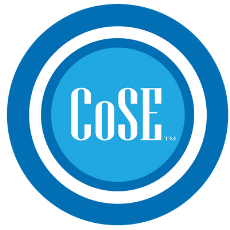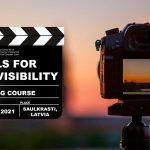To educate youngsters and inspire their communities
What is ERASMUS + ?
Erasmus+ is the EU’s programme to support education, training, youth and sport in Europe. Its budget of €14.7 billion will provide opportunities for over 4 million Europeans to study, train, and gain experience abroad. Circle of Sustainable Europe (CoSE) is organizing several youth exchanges every year. The aim of Erasmus+ is to contribute to the Europe 2019-2027 strategy for growth, jobs, social equity and inclusion, as well as the aims of ET 2020, the EU’s strategic framework for education and training.
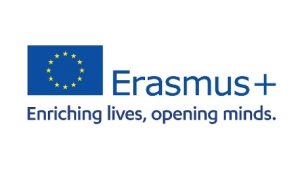
Erasmus+ also aims to promote the sustainable development of its partners in of higher education, universities, and amongst NGO’s focussed on youth empowerment to contribute to achieving the objectives of the EU Youth Strategy. And that is where Circle of Sustainable Europe comes in, combined with our strategy, values, and principles, during these youth exchanges we make sure the true meaning of ‘sustainability’ in general is communicated to the youngsters in terms of their: lifestyle, health, awareness, contribution, mindset, and ownership to take leadership within their own community to address the issue of the Sustainable Development Goals (SDG’s).
What are the specific issues tackled by this Program?
Fighting high levels of unemployment – particularly among young people – is one of the most urgent tasks for European governments. Too many young people leave school prematurely running a high risk of being unemployed and socially marginalised. The same risk threatens many adults with low skills. Technologies are changing the way in which society operates, and there is a need to ensure the best use is made of them. EU businesses need to become more competitive through talent, social skills and innovation.

Europe needs more cohesive, inclusive, and sustainable societies which allow citizens to play an active role in their community. Education, training, youth work, and sport are key to promote common European values, foster social integration, enhance intercultural understanding and a sense of belonging to a community, and to prevent violent radicalisation. Erasmus+ is an effective instrument to promote the inclusion of people with disadvantaged backgrounds, including newly arrived migrants.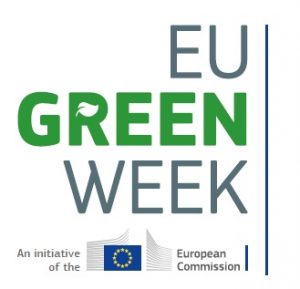
Another challenge relates to the development of social capital among young people, the empowerment of young people, and their ability to participate actively in society, in line with the provisions of the Lisbon Treaty to “encourage the participation of young people within communities in Europe”. This issue can also be targeted through non-formal learning activities, which aim at enhancing the skills and competencies of young people as well as their active citizenship. Moreover, there is a need to provide youth organizations and youth workers with training and cooperation opportunities, to develop their professionalism and the European dimension of youth work.
Well-performing education and training systems and youth policies provide people with the skills required by the labour market and the economy, while allowing them to play an active role in society and achieve personal fulfilment. Reforms in education, training and youth can strengthen progress towards these goals, on the basis of a shared vision between policy makers and stakeholders, sound evidence, and cooperation across different fields and levels. Set to last until 2027, Erasmus+ doesn’t just have opportunities for students. Merging multiple programs and trainings, it has opportunities for a wide variety of individuals and organisations.
Circle of Sustainable Europe (CoSE) utilizes this opportunity to better support youth workers around Europe and beyond, from all kinds of backgrounds, experiences, and livelihoods. We are a socially multicultural Non-Governmental Organization that makes us resilient working with various other loyal partners. Find some more information about our projects here:
#1 Erasmus+ Project: Tools for social visibility
Project Reference: 2020-2-BE05-KA105-003014
“Tools for social visibility” took place between 29 August – 7th of September 2021, in Saulkrasti, Latvia and brought together 27 members from 6 EU countries. Participants are 24 youth workers – in their function as project coordinators, mentors of volunteers, responsible for marketing and promotion – from Belgium, Latvia, Poland, Spain, Lithuania, Bulgaria.
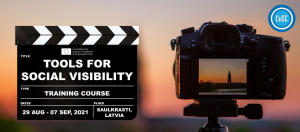
The activities of the project were planned according to the principles of the Erasmus+ Programme. It had a diversity of non-formal and informal methods to stimulate online and offline learning methodologies for participants. Trainers created a friendly space for participants to focus on their learning and encouraged active participation, creativity, and initiative. The project had a participative and learner-centered approach. As the participation of the youth workers is on a voluntary basis, therefore it is closely linked to their personal needs, aspirations, and interests.
Main objectives of the project were:
- Discovering the Erasmus+ program, its objectives, priorities, and motivating youth workers to apply the acquired knowledge about Erasmus+ by creating future collaborations and projects.
- Created a platform of sharing and discussing with youth workers about their promotional tools like: social media, photo, video, exhibitions, fairs, street actions etc. We showed participants in “live” format how to arrange and organize these tools.
- Raised awareness on the social issues relevant to Erasmus+ priorities and the work of youth workers among them as well as their target groups.
- Stimulated the sense of responsibility for their work among participants through the creation of new methods of stimulating the active work of young people.
- Highlighted the role of digital skills as a tool to fight youth unemployment.
- Developed basic digital skills using a creative approach towards social media, art of photo and video activity by attending dynamic workshops and practical work.
To ensure a high – quality non-formal learning:
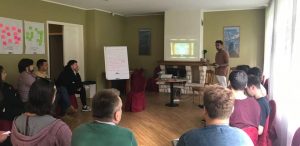
Presentation Offline & Online Promotion
- Participants learnt in non-formal contexts voluntarily and not obligatory.
- Participants were involved in the planning, preparation, implementation and evaluation of the project;
- The activities took place in a diverse range of environmental situations. It took place at the same time inside the venue, outside in different surroundings of the venue, and they were given different tasks to accomplish this.
During the entire project participants worked together on their own social campaigns devoted to their work in their organizations. After the teambuilding, creative, and organizational fair activities they were divided into small groups according to their interests and field of work. In every training session they’ve had to use newly gathered skills and competences in practice. Moreover, local youth were involved in the follow-up of the project, they participated in spreading the good results created during the project.
Partner organizations involved in this project:
- Kulturas un izglitibas biedriba “YStreet”
- Ideas for Life (Poland)
- SDRUZHENIE ALTERNATIVI INTERNATIONAL
- ASOCIACIJA TAVO EUROPA
- Ticket2Europe
#2 Erasmus+ Project: Be The Game Changer
Youth Exchange “Be the Game Changer” was developed thanks to active involvement of 8 consortium member organizations from 4 EU countries (Belgium, Latvia, Lithuania, Spain) and 4 EaP region countries (Armenia, Georgia, Ukraine and Moldova). The implementation of the project is planned for 01-12 April 2021 in Tsaghkadzor, Armenia.
 Be The Game Changer was the title of the training course we coordinated, alongside the hosting organizer and trainers. We learned how to tackle topics like discrimination, violence, hate speech, and online bullying on social media, specifically to fight real-life problems such as youth unemployment, intercultural and inter-religious dialogue, and critical thinking in Europe, especially for the youths.
Be The Game Changer was the title of the training course we coordinated, alongside the hosting organizer and trainers. We learned how to tackle topics like discrimination, violence, hate speech, and online bullying on social media, specifically to fight real-life problems such as youth unemployment, intercultural and inter-religious dialogue, and critical thinking in Europe, especially for the youths.
The project took place in Tsachkadzor, Armenia, (17 Oct-28 Oct.) thanks to the Erasmus+ program and hosting organization we were able to share, learn, experience, enjoy and laugh with people from other European countries. The program seeks a different approach where we can experience other cultures and get to know our European friends and neighbors better, that is, a way to create bonds between people who otherwise would never have met.
Thus, the main objectives of the project are:
• To boost participants’ awareness about European multiculturalism, cultural values, and tolerance;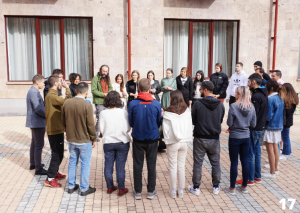
• To advance intercultural dialogue, solidarity, social inclusion, and mutual understanding between youth from the EU and EaP region countries;
• To provide knowledge about partner countries’ traditional games and explore them from educational and cultural perspectives;
• To transform traditional games’ learning components into team building activities, energizers and icebreakers, that can be used within non-formal education projects;
• To identify and explore the opportunities provided by the EU Erasmus+ program from mobility, non-formal and cultural education perspectives;
• To identify the competencies obtained through European non-formal education projects and their certification by Youthpass;
Brochure can be found here
Progress Report can be found here
